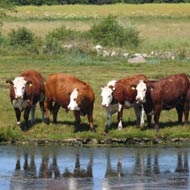Welsh farmers urged to be cautious when buying cattle

Farmers were warned about the risks of buying cattle that may not have been tested for up to four years.
The chair of the north Wales Regional TB Eradication Delivery Board has reminded farmers in north Wales about the importance of considering potential TB risk when sourcing cattle.
Peredue Hughes said: "We are fortunate in north Wales that TB is less of a problem than it is in other areas but I am concerned that this can lead to some farmers being complacent when they source cattle.
"The priority for us in north Wales is to prevent the disease from spreading into the area and becoming established, as it has in other parts of the country. To do this we need all cattle keepers in north Wales to think about the potential TB risk when they source cattle.
“Farmers need to consider the disease situation in the area that they are sourcing cattle from. It is always useful to ask how long a herd has been TB free because a herd with a recent history of the disease is likely to be a higher risk than herds that have never had TB.”
Mr Hughes also warned about the risk of buying cattle that may not have been tested for up to four years:
“All herds in Wales are tested at least once a year but herds in some other parts of Great Britain are only tested once every four years. Developing a one-size-fits-all measure of TB risk for different areas and testing intervals is complex. Irrespective of where animals are purchased from it is important to know the TB history of the herd and the disease history of the animal. With this in mind, farmers looking to buy cattle from a four-yearly testing area should also make it clear that they are only interested in buying cattle that have been pre-movement tested.”
Christanne Glossop, Wales' chief veterinary officer, added: “This is something that farmers throughout Wales should consider because introducing any new animal to a herd can be a potential disease risk and this is not confined to TB. Despite the surveillance and control measures we have in place, it is not possible to fully eliminate the risk of cattle being infected with TB so I urge all farmers to exercise caution when buying cattle.
“By asking for information about the disease history of an animal, and the herd it comes from, cattle farmers will be able to make an informed decision about the level of risk and how to manage it.”



 The latest
The latest